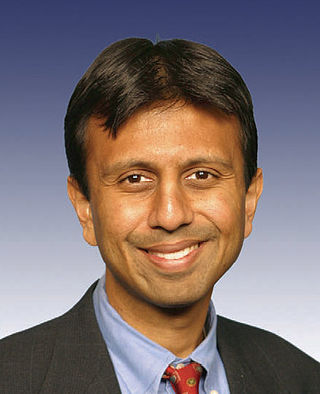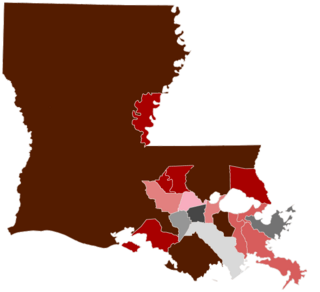
St. Joseph, often called St. Joe, is a town in, and the parish seat of, rural Tensas Parish in northeastern Louisiana, United States, in the delta of the Mississippi River. The population was 1,176 at the 2010 census. The town had an African-American majority of 77.4 percent in 2010.

Pinckney Benton Stewart Pinchback was an American publisher, politician, and Union Army officer. Pinchback was the second African American to serve as governor and lieutenant governor of a U.S. state. A Republican, Pinchback served as acting governor of Louisiana from December 9, 1872, to January 13, 1873. He was one of the most prominent African-American officeholders during the Reconstruction Era.

Louis Alfred Wiltz was an American politician from the state of Louisiana. He served as 29th Governor of Louisiana from 1880 to 1881 and before that time was mayor of New Orleans, lieutenant governor of Louisiana, and a member of the Louisiana House of Representatives.

The Seal of Louisiana is the official government emblem of the U.S. state of Louisiana. Originally devised in 1812, the latest version was enacted in 2006.

The 2007 Louisiana gubernatorial election was held on October 20. The filing deadline for candidates was September 6. On the day of the election, all 12 candidates competed in an open jungle primary. Bobby Jindal won the election with 54%. This was the first time since 1967 in which the winner of a Louisiana gubernatorial election was of the same party as the incumbent president.

The first round of the Louisiana House election of 2006 were held on Tuesday, November 7, 2006. The terms of all seven Representatives to the United States House of Representatives will expire on January 3, 2007, and will be put up for contest. The winning candidates will serve a two-year term from January 3, 2007, to January 3, 2009. If necessary, a runoff round will be held on December 9, 2006.

Henry Warren Ogden was a member of the United States House of Representatives for Louisiana's 4th congressional district.

The 1908 Louisiana gubernatorial election was held on April 21, 1908. Like most Southern states between Reconstruction and the civil rights era, Louisiana's Republican Party had minimal electoral support because of the mass disenfranchisement of African Americans. This meant that the Democratic Party primary held on January 28 was the most important contest to determine who would be governor. This election marked the first time Louisiana used primaries to nominate party nominees. Republicans nominated Henry Newton Pharr, son of the party's 1896 nominee, John Newton Pharr. The election resulted in the election of Democrat Jared Y. Sanders Sr. as governor of Louisiana.

The 1904 Louisiana gubernatorial election was held on April 19, 1904. Like most Southern states between Reconstruction and the civil rights era, Louisiana's Republican Party had virtually no electoral support. As Louisiana had not yet adopted party primaries, this meant that the Democratic Party convention nomination vote was the real contest over who would be governor. The election resulted in the election of Democrat Newton C. Blanchard as governor of Louisiana.

The 1900 Louisiana gubernatorial election was held on April 17, 1900. This was the first state election after the adoption of Louisiana's 1898 constitution, which disenfranchised nearly all of the state's Black voters, who had been the core supporters of the Republican Party. The constitution had been prompted by the unusually strong voter support for Republicans and Populists in the 1896 Louisiana gubernatorial election.

The 1842 Louisiana gubernatorial election was the ninth gubernatorial election to take place after Louisiana achieved statehood. Under Article III Sec 2 of the 1812 Constitution of the State of Louisiana the Governor was elected in two steps. On the first Monday in July, eligible voters went to the polls and voted. The returns were sent to the President of the Louisiana State Senate. On the second day of the session of the Louisiana State Legislature, the Louisiana House of Representatives and Senate met in joint session and voted between the top two candidates. The candidate who received a majority in General Assembly became governor. This was the last election held under the Constitution of 1812, the next election was held under the Constitution of 1845.

The 1859 Louisiana gubernatorial election was the third election to take place under the Louisiana Constitution of 1852. As a result of this election Thomas Overton Moore became Governor of Louisiana. This was the last Louisiana gubernatorial election before the outbreak of the Civil War.

The 1864 Louisiana gubernatorial (Union) election was the first election to take place under the Louisiana Constitution of 1864. As a result of this election Michael Hahn became Governor of Union-controlled Louisiana.

The 1865 Louisiana gubernatorial election was the second election to take place under the Louisiana Constitution of 1864. As a result of this election James Madison Wells was re-elected Governor of Louisiana. The result was a lopsided victory for Wells because many whites, who supported the Democratic Party, remained disqualified due to their support of the Confederacy. Nonetheless Democrats nominated fugitive former Governor Henry Watkins Allen.

The 1868 Louisiana gubernatorial election was held over two days, April 17 and 18, the same days that voters were asked to ratify the new Louisiana Constitution of 1868, which established the civil rights of African Americans. As a result of this election Henry Clay Warmoth was elected Governor of Louisiana. At age 26 he was the youngest governor in the state's history. The result was a lop-sided result for Warmoth because of the Republican Party's overwhelming support among African Americans, who were a majority of the state's population at the time.

The 1872 Louisiana gubernatorial election was the second election to take place under the Louisiana Constitution of 1868. As a result of this election William Pitt Kellogg was elected Governor of Louisiana, but not before federal troops stepped in to enforce his election. The results of this election were highly contentious and resulted in racial violence across the state, including the Colfax massacre. U. S. President Ulysses S. Grant had to step in and formally recognize Kellogg as Governor to resolve the violence. Kellogg's Democratic opponent John McEnery finally conceded the election in September 1874 after briefly overthrowing Kellogg's government.

The 1876 Louisiana gubernatorial election was the third and final election to take place under the Louisiana Constitution of 1868. As a result of this election Francis T. Nicholls became Governor of Louisiana, but not before the election was contested by his opponent. The results of this election, like those of 1872, were disputed. The dispute was resolved by the Compromise of 1877 which gave the Governor's Mansion to Democrat Francis T. Nicholls. The Compromise also gave Republican presidential candidate Rutherford B. Hayes the electoral votes of several disputed states, including Louisiana, which resulted in his election to the White House. The election of Nicholls marked the end of Reconstruction in Louisiana and the decline of the Republican Party of Louisiana.

The 1884 Louisiana gubernatorial election was the second election to take place under the Louisiana Constitution of 1879. As a result of this election Samuel D. McEnery was re-elected Governor of Louisiana. The election saw widespread intimidation of African-Americans which guaranteed the election of the Democratic nominee.

The 1888 Louisiana gubernatorial election was the second election to take place under the Louisiana Constitution of 1879. As a result of this election Francis T. Nicholls was re-elected Governor of Louisiana. The election saw widespread intimidation of African-Americans which guaranteed the election of the Democratic nominee.












